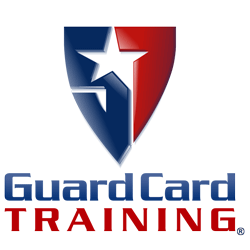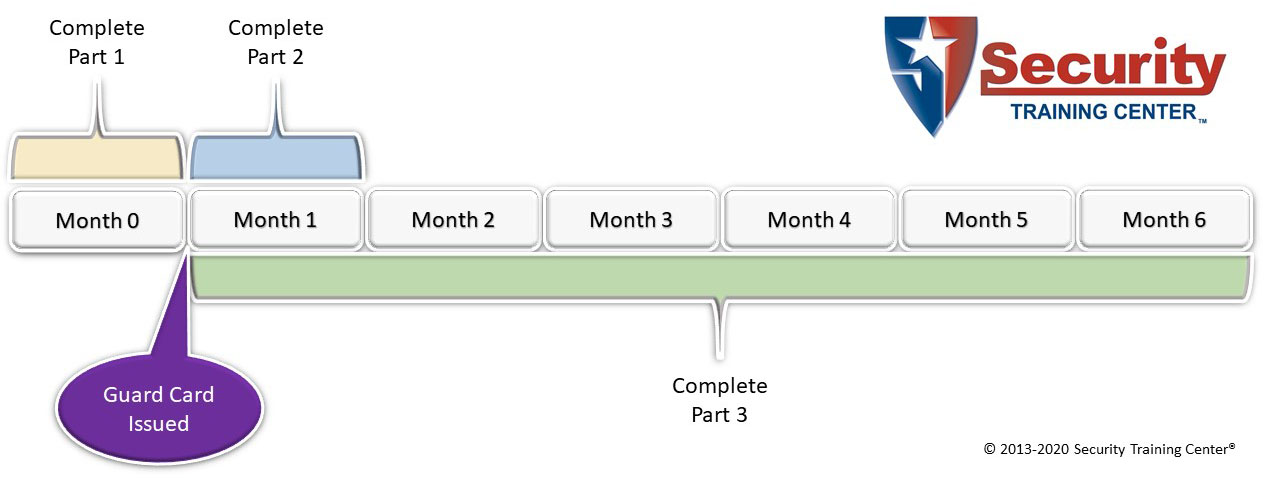
How do I get a California BSIS Security Guard Card Registration/License?
Sections
- Overview
- Three (3) Steps to Earning Your California Guard Card
- Guard Training Timelines
- Course Prices
- BSIS Fees
- Live Scan (Background Check) Fees
- Requirements to Become an Unarmed Security Guard
- Convictions
Overview
All professional security guards that work in the state of California must be licensed and registered with the Bureau of Security and Investigative Services (BSIS). To be properly licensed, the security guard must complete a standard course in the powers of arrest, weapons of mass destruction/terrorism awareness, public relations, observation and documentation, communication and its significance, liability/legal aspects and other elective courses that vary depending upon the training facility.

The BSIS requires an entire 40-hours of training. However, the training may be completed in three (3) parts. The training is split into parts to allow the guard to start working quickly, while still maintaining some of the highest standards in the industry.
The applicant is allowed to start working after successfully completing the first 8-hours of training (called the "Powers to Arrest" course), passing a written exam, passing a fingerprint/background check and submitting the BSIS application with appropriate fees.
The certificates of completion for the remaining 32-hours of training (Parts 2 and 3) are not sent to the BSIS. They are copied and logged by the employer in the permanent employee records. During an audit, the employer must present the BSIS with proof of complete 40-hours of training for every security guard employed or face severe fines for every guard who has not completed the required training.
The applicant may not start working as a security guard until he or she receives the security guard registration card in the mail, or the security guard registration number appears on the BSIS website. Most employers will not even interview a prospective employee unless he or she already holds at least the guard card.
California allows unarmed guard card training to be completed online. Permit for Exposed Firearm and Baton Permit courses must be taught in a classroom setting (instructor-led) with practical exercises.
Our training program complies with all requirements as mandated by the California Department of Consumer Affairs Bureau of Security and Investigative Services (BSIS).
At the end of our courses, while passing all exams with a score of 100% in accordance with regulations, students are provided with:
- All paperwork required to apply for a California Security Guard Registration:
- Application for Security Guard Registration
- Request for Live Scan Service forms
- A Certificate of Training Completion
- NOTE: The actual license is issued by the State of California, not the trainer.
We are licensed by the Bureau of Security and Investigative Services (BSIS). TFF 1616
Three (3) Steps to Earning Your California BSIS Guard Card
Step 1: Complete Mandatory Training
Complete the training course: Either the pre-assignment 8-hours "Power to Arrest" course or the complete 40-hours package.
This is the service provided by Security Training Center®Step 2: Complete the application forms and pay the BSIS fees
The application can be submitted by mail or online. The mail-in forms will be provided once the course is successfully completed. The mail-in forms include all of the information to complete the online forms.
Online Application Form.Step 3: Live Scan Fingerprints and Background Checks
Locate a local Live Scan Operator. Take the provided Live Scan forms to the operator and complete the digital fingerprinting process. The Live Scan Operator will collect the FBI and DOJ fees, plus a "rolling" service fee.
Guard Training Timelines
You may stand post after an eight-hour course and receiving your Guard Card from the State of California. Afterwards, you have 30-days to complete your first sixteen hours of training and then another six months to complete the remaining sixteen hours (for a total of forty hours of training). You may elect to take all forty-hours of Security Guard Card training at one time.

Guard Card Course Prices
| Course | Price | Buy | Login |
|---|---|---|---|
| Part 1, 8-Hours Initial Training (PoA & WMD) | $17.99 | ||
| Part 1, 2, & 3; 40-Hours Complete Training | $84.99 | ||
| Part 2 (16-hours) | $37.99 | ||
| Part 3 (16-hours) | $37.99 | ||
| Parts 2 and 3 (32-hours combo) |
$74.99 | ||
| Chemical Agents/Defensive Spray (stand alone) | $29.99 | ||
| Annual BSIS Continuing Education (8-hours) | $23.99 | ||
| Customer Relations | $29.99 | ||
| Introduction to Fire Patrol | $49.99 | ||
| Harassment and Abusive Conduct Prevention | $23.99 | ||
| FREE Building an Effective Security Guard Resume | FREE |

BSIS Guard Card License Fees
Back to topAdditional Fees
In addition to the course costs, the student must pay application fees to the BSIS and Live Scan (fingerprint/background check) fees to the DOJ/FBI. These fees ARE NOT COLLECTED by the trainer. These fees are paid directly to the appropriate agency. Please see the table below.
BSIS Application Fees
| Security Guard (G) | Fee |
|---|---|
| Initial | $55 |
| Renewal | $40 |
| Replacement Certificate | $25 |
Guard Card Live Scan (Background Check) Fees
Applicants for a BSIS Security Guard Registration must undergo a criminal history background check through the FBI and DOJ. Applicants should use the Security Guard Request for Live Scan Form available on the Bureau's website as it contains the correct coding needed to ensure the Bureau receives the information in a timely manner. Applicants are responsible for paying all Live Scan, DOJ and FBI processing fees at the time of fingerprinting. Live Scan locations can be found on the Bureau's website.
Applicants must submit fingerprints electronically using Live Scan. Fees are paid to the Live Scan operator.
| Item | Fee |
|---|---|
| Department of Justice (DOJ) Fingerprint Fee | $32.00 |
| Federal Bureau of Investigation (FBI) Fingerprint Fee | $17.00 |
| Live Scan Operator Fees (Set by Live Scan operator) |
Variable |
| Total | $49.00+Variable |
Requirements to Become an Unarmed Security Guard
The general requirements for a Security Guard are:
- Be at least 18 years old
- Undergo a criminal history background check through the California Department of Justice (DOJ) and the Federal Bureau of Investigation (FBI); and
- Complete a 40-hours course of required training.
There is no citizenship requirement to be an unarmed security guard in California. Employment requirements still apply.
Convictions
We receive many questions from potential students who have convictions who want to work as security guards. We cannot offer legal advice and cannot guarantee that the BSIS will issue a Security Guard Registration Card. We have been informed that the BSIS will not discuss specific cases prior to receiving a formal guard application and all fees have been paid. This requires that at least the 8-hour "Power to Arrest" course be completed, plus a Live Scan and Application fees. Therefore, the estimated costs to determine if the person with a conviction is even eligible to work as a security guard is approximately $143.
All applicants with convictions will have their applications sent to the Disciplinary Review Committee. This may add up to 120 days of processing time to the application.
From the Application For Security Guard Registration:
Be sure to answer all questions on the application completely and truthfully. Any omission or false statement on the application may constitute grounds for denial or subsequent revocation of the registration.
A registration may be denied to any person who makes a false statement or who has been convicted of any crime or act substantially related to the functions or duties of a security guard. However, the Bureau will consider evidence of rehabilitation.
Question 7 on the Application for Security Guard Registration asks:
7.a Have you ever been convicted of, or pled guilty or nolo contendere to ANY criminal or civil offense in the United States, it’s territories, or a foreign country? This includes every citation, infraction, misdemeanor and/or felony. Convictions that were adjudicated in the juvenile court or convictions under California Health and Safety Code sections 11357(b), (c), (d), (e) or section 11360(b) which are two years or older, as well as criminal charges dismissed under section 1000.3 of the Penal Code or equivalent non-California laws, should NOT be reported. Convictions that were later dismissed pursuant to sections 1203.4, 1203.4a, or 1203.41 of the California Penal Code or equivalent non-California law MUST be disclosed. YES/NO
7.b Is any criminal action pending against you, or are you currently awaiting judgment and sentencing following entry of a plea or jury verdict? YES/NO
More information can be found here:
Frequently Asked Questions - Informal Review before the Disciplinary Review Committee (DRC)
Serving California for over a decade!
Our stelar customer service team supports communities all over California including: Anaheim, Baker, Bakersfield, Blythe, Carlsbad, Chico, Doyle, Escondido, Eureka, Fairfield, Folsom, Fort Bragg, Fort Dick, Fresno, Hesperia, Indio, Lake Tahoe, Lancaster, Long Beach, Los Angeles, Madera, Merced, Modesto, Monterey, Napa, Palm Desert, Palm Springs, Palmdale, Palo Alto, Petaluma, Red Bluff, Redding, Riverside, Roseville, Sacramento, Salinas, San Bernardino, San Diego, San Fernando Valley, San Francisco, San Joaquin Valley, San Jose, Santa Barbara, Santa Rosa, Stockton, Temecula, Truckee, Tulare, Vacaville, Visalia, Weed, Yreka, and Yuba City.
